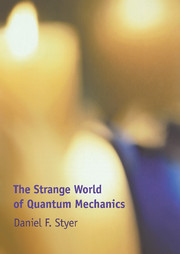Book contents
- Frontmatter
- Dedication
- Epigraph
- Contents
- Preface
- 1 Introduction
- 2 Classical Magnetic Needles
- 3 The Stern–Gerlach Experiment
- 4 The Conundrum of Projections; Repeated Measurements
- 5 Probability
- 6 The Einstein–Podolsky–Rosen Paradox
- 7 Variations on a Theme by Einstein
- 8 Optical Interference
- 9 Quantal Interference
- 10 Amplitudes
- 11 Working with Amplitudes
- 12 Two-Slit Inventions
- 13 Quantum Cryptography
- 14 Quantum Mechanics of a Bouncing Ball
- 15 The Wavefunction
- Appendix A A Brief History of Quantum Mechanics
- Appendix B Putting Weirdness to Work
- Appendix C Sources
- Appendix D General Questions
- Appendix E Bibliography
- Appendix F Skeleton Answers for Selected Problems
- Index
- References
5 - Probability
Published online by Cambridge University Press: 05 August 2014
- Frontmatter
- Dedication
- Epigraph
- Contents
- Preface
- 1 Introduction
- 2 Classical Magnetic Needles
- 3 The Stern–Gerlach Experiment
- 4 The Conundrum of Projections; Repeated Measurements
- 5 Probability
- 6 The Einstein–Podolsky–Rosen Paradox
- 7 Variations on a Theme by Einstein
- 8 Optical Interference
- 9 Quantal Interference
- 10 Amplitudes
- 11 Working with Amplitudes
- 12 Two-Slit Inventions
- 13 Quantum Cryptography
- 14 Quantum Mechanics of a Bouncing Ball
- 15 The Wavefunction
- Appendix A A Brief History of Quantum Mechanics
- Appendix B Putting Weirdness to Work
- Appendix C Sources
- Appendix D General Questions
- Appendix E Bibliography
- Appendix F Skeleton Answers for Selected Problems
- Index
- References
Summary
I interpreted the repeated measurement experiments of the previous chapter by saying that quantum mechanics can find probabilities only, not certainties (that is, that quantum mechanics is “probabilistic”, not “deterministic”). You may object, maintaining that the world is deterministic, but that my particular deterministic scheme (the “magnetic arrow”) is incorrect. The next chapter presents an ingenious argument, invented by Einstein, which shows that no local deterministic scheme could give the results observed by experiment. In order to understand that argument you need some background in probability.
But in fact, a knowledge of probability is generally useful in day-to-day life as well as in physics. You walk across a street — what is the probability of your being hit by a car? You are advised to undergo elective surgery — what is the probability that the surgery will extend your life, and what is the probability that the surgery will go wrong and injure you? You breath some asbestos or smoke a cigarette — what is the probability of contracting cancer? Misconceptions about probability abound and can lead to disastrous public policy decisions. A knowledge of quantum mechanics is good for your soul, but it is of practical importance only to the designers of lasers, transistors, and superconductors. A knowledge of probability is of practical importance to everyone.
- Type
- Chapter
- Information
- The Strange World of Quantum Mechanics , pp. 31 - 37Publisher: Cambridge University PressPrint publication year: 2000



